Digging in the dirt may not heal the emotional wounds of war, but for some battle-scarred veterans, farming sure as hell helps.
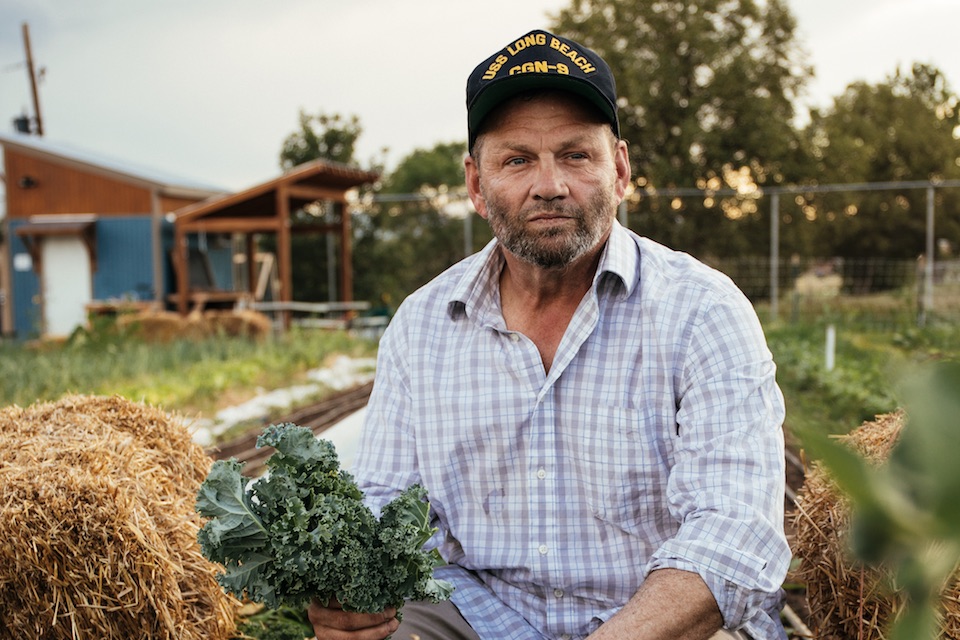
While stationed in Kuwait during the first Gulf War, Bauman developed PTSD - which went undiagnosed for almost 25 years. In 2014, the Navy vet discovered a Denver-based program called Veterans to Farmers and now works at three local farms, including Sprout City Farms, pictured here.
When the Gulf War erupted in 1990, John Bauman shipped off to Kuwait. Then a hopeful 25-year-old from the Chicago suburbs, he’d joined the Navy a year before, in peacetime, to pay for college. Instead, Bauman received a different kind of education. As he watched hundreds of oil wells ablaze, transforming the emirate into a constant gloaming of smoke and ash, the aspiring engineer realized he’d never seek a career in the lucrative petroleum industry. “I saw Kuwait on fire,” Bauman says. “I saw how this ends.”
Four years later, he left the Navy and earned a mechanical engineering degree. But after being laid off from a water-pump company in 2005, Bauman bounced through a string of temp jobs, all the while battling what he calls “untreated rage.” For a spell, he was homeless. Finally, in 2013, Bauman landed in Denver, where he was diagnosed with post-traumatic stress disorder (PTSD), and a caseworker suggested the local agricultural-training program Veterans to Farmers.
Bauman, 52, now juggles part-time gigs at three area farms: Rebel Farm, CityGal Farms, and Sprout City Farms. He earns $9 an hour – hardly a living, yet enough to fuel his dreams. “I’d like to have my own greenhouse someday,” he says. “I’d like to grow food for friends and family, for people who can’t provide for themselves.”
At Rebel Farm, Bauman works alongside Army vet Joe Burner, also afflicted with PTSD. Burner, who completed two tours in Iraq and has since come out as gay, discovered Veterans to Farmers following a 2015 suicide attempt. “Every morning, I wake up and remember that I’m investing in my community,” the 43-year-old says. “I’m giving everything I can of myself.”
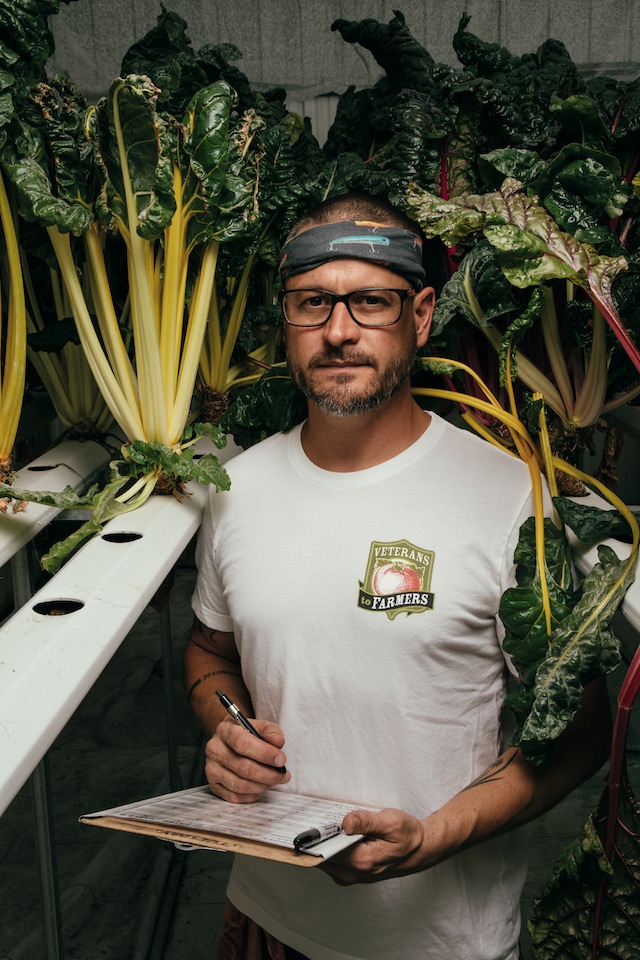
Joe Burner
Burner, who completed two tours in Iraq with the Army, joined Veterans to Farmers following a 2015 suicide attempt. “I give my spirit to these plants,” he says of the rainbow chard and other vegetables he tends at Rebel Farm’s greenhouse in Denver.
On down days, when Burner’s demons come chasing, he visits the rainbow chard in the greenhouse’s northwest corner. “The colors remind me of diversity and of service, because the Army Service Ribbon we get is a rainbow,” he explains. “This plant is really strong, the abuse it can take. I tore the leaves off one a few days ago. Look! It’s back!”
Every morning, I wake up and remember that I’m investing in my community. I’m giving everything I can of myself.
Any healing that comes tends to be complicated and hard-won. “We’re not your therapists,” insists Buck Adams, a former Marine and the founder of Veterans to Farmers. “We’re your peers. We’re here to help, whether that’s with a kick in the ass or a shoulder to cry on. If you fall in love with farming, great. You’ll have a network to support you.”
According to the nonprofit’s executive director, retired Air Force infantryman Rich Murphy, “We’re creating a climate for veterans to find purpose. Many of us went into the military because we wanted to contribute to something bigger than ourselves. This is a way to do that.”
Let’s avoid maudlin talk of taking life versus cultivating it. The only folks who said such things to me as I reported this article were those who hadn’t served. Over the past year, I interviewed dozens of veteran-farmers across the country. No single path funnels them into agriculture; no sole explanation makes sense of why they stay. To choose farming these days requires a hard turn onto the dirt road less traveled, one both unpredictable and unpopular.
American farmers over the age of 65 currently outnumber those under 35 by a ratio of six to one. A century ago, agriculture employed 40 percent of the national workforce; today, just 1 percent. Conscripting soldiers to solve this labor shortage is not a new concept.
In 1918, Franklin Lane, secretary of the interior under Woodrow Wilson, proposed selling idle acreage to World War I veterans on favorable terms, stipulating that they farm the land. “Being American and being young, they will not ask or expect pensions,” Lane said. “They will want work. They will want, if possible, a chance for a home of their own.”
The post”“World War II G.I. Bill codified such thinking by earmarking funds for low-interest farm loans and agricultural education, enabling 700,000 vets to receive farm-related training before the legislation expired in 1956. Future G.I. Bills, though, prioritized science, engineering, and math. Of the World War II veterans eligible for G.I. Bill benefits, 4.5 percent opted for on-farm experience. A mere 0.4 percent of Vietnam veterans did so.
More recently, however, Admiral Mike Mullen, chairman of the Joint Chiefs of Staff under Presidents George W. Bush and Barack Obama, identified global food security, and thus the world’s farmers, as key to a holistic vision of national security. In a 2010 speech, Mullen declared, “Scarcity of water, food, and space . . . could lead to failed states, instability, and, potentially, radicalization.” In 2014, the Farm Bill established the position of military veterans agricultural liaison within the USDA, which offers low-interest loans to veterans interested in agriculture.
“Farming is as important as the military in defending the country,” says Michael O’Gorman. An organic farmer in California, but not a veteran, O’Gorman started the nonprofit Farmer Veteran Coalition in 2007 to provide members of the armed forces with agricultural learning and networking opportunities. The coalition also awards grants for equipment and infrastructure, underwritten by sponsors like Kubota, Clif Bar, and Newman’s Own. A few years ago, upon learning that the Kentucky Department of Agriculture had launched a “Homegrown By Heroes” label to differentiate veteran-farmed goods, O’Gorman gained permission from Kentucky officials to expand and manage the label in the other 49 states.
“Homegrown By Heroes” has helped former military police officer Sarah Orban, who was stationed in Mosul during the Iraq War. Orban noticed a spike in farmers-market sales as soon as she added the label to her Michigan maple farm’s syrups, sugars, candies, and seasoning blends – once grossing $1,200 in a single day. “What makes my products special?” the 31-year-old asks rhetorically. “I have the ‘Homegrown By Heroes’ label. It gets people’s attention.”
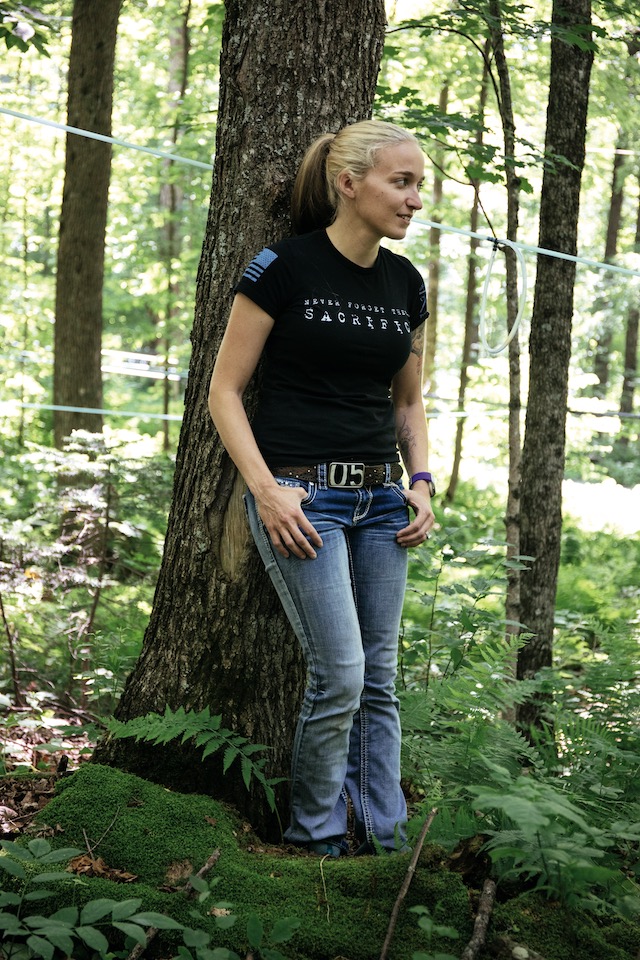
Sarah Orban
A ninth-generation Vermont maple farmer and an ex-military police officer, Orban saw an increase in sales after adding the Farmer Veteran Coalition’s “Homegrown By Heroes” label to her syrups, sugars, candies, and seasoning blends.
Last summer, her dad called to see if she’d come home and oversee part of the Vermont maple farm their family has operated for the past two centuries. Orban relocated in October, bringing with her the recipes she developed in Michigan for a maple-based dry rub and French toast mix. She plans to produce and sell those in Vermont – with a “Homegrown By Heroes” label, of course.
In mid-2005, between his second and third Iraq deployments, Marine Sergeant Colin Archipley bought three acres outside San Diego. On September 5 of that year, he returned to the Middle East, and on October 17, his wife, Karen, a hatmaker, decamped to the property.
If Colin were a fedora – sober, handsome, understated – Karen would be a fascinator, petite yet attention-grabbing. A natural storyteller, she recounts those initial days with characteristic urgency: “I was watching the war on the news in the middle of the night, when they show the truly scary stuff. Oh, my God, it was awful. He’d write, and his letters freaked me out. ‘Yeah, we left this morning with twelve guys and came back with eight.’ Then he’d add, ‘Did you get the permit for the well? Did you do this? Did you do that?’ His ‘honey-do’ list was long. But it was what we were building together. The farm brought him home.”
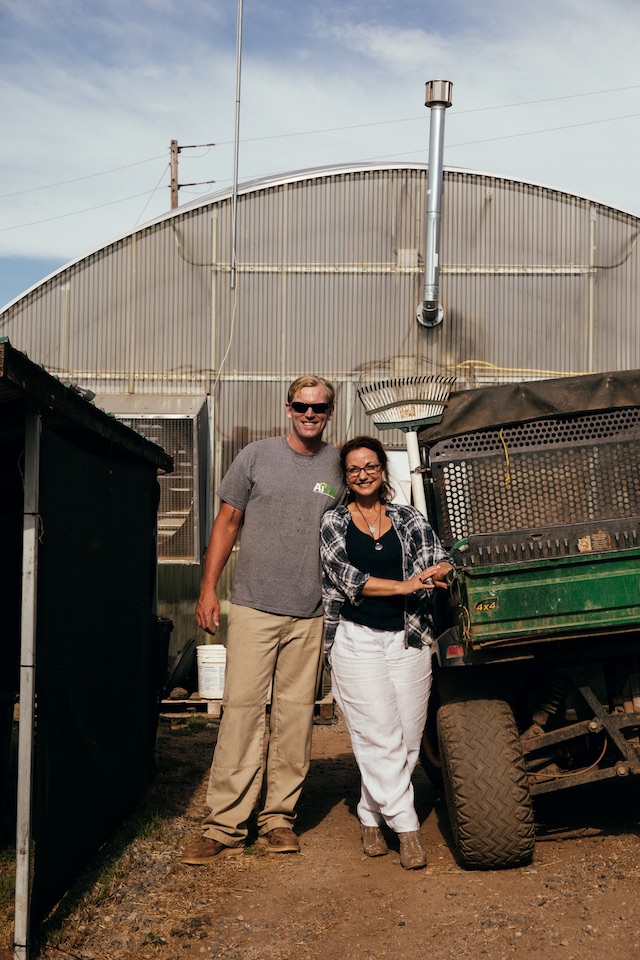
Colin and Karen Archipley
Amid three deployments to Iraq as a Marine, Colin started Archi’s Acres, an organic farm outside San Diego, with the help of his wife, Karen. The couple also founded the training program Archi’s Institute in hopes of providing other vets with opportunities in sustainable agriculture.
Colin, an extreme introvert, says farming appealed to his need to be his own boss, to be outside, to escape deskbound decrepitude. The 36-year-old had been thinking about injustice: “Immigration, health care, climate change – that’s where the challenges lie, and that’s where we see an opportunity.”
He and Karen have weathered unpleasant surprises, such as an early water bill so steep it caused the couple to pivot toward greenhouse growing and a moisture-retentive coconut-fiber medium. Nevertheless, the Archipleys decided to mentor fellow vets in 2007, an initiative that’s since matured into Archi’s Institute for Sustainable Agriculture, a joint venture with California State Polytechnic University, Pomona. More than 500 graduates have completed the full-time six-week (or part-time 12-week) course.
They tend to stick around. Brooklyn-born graduate Will Downing, a naval aviation electrician who worked for the cutting-edge aeronautics firm SpaceX, now manages the greenhouses at the Archipleys’ organic farm, Archi’s Acres. “I fucking hate engineers,” admits Downing. “Plants aren’t pompous assholes. Plants don’t talk back.”
Paul Neely, the institute’s head field instructor, arrived as a student a few years back, after 15 months in Iraq had rendered him near-silent from severe PTSD. Neely can’t forget the day he exited a building as a group of fellow soldiers entered it – and a bomb exploded. “The building collapsed,” he says softly.
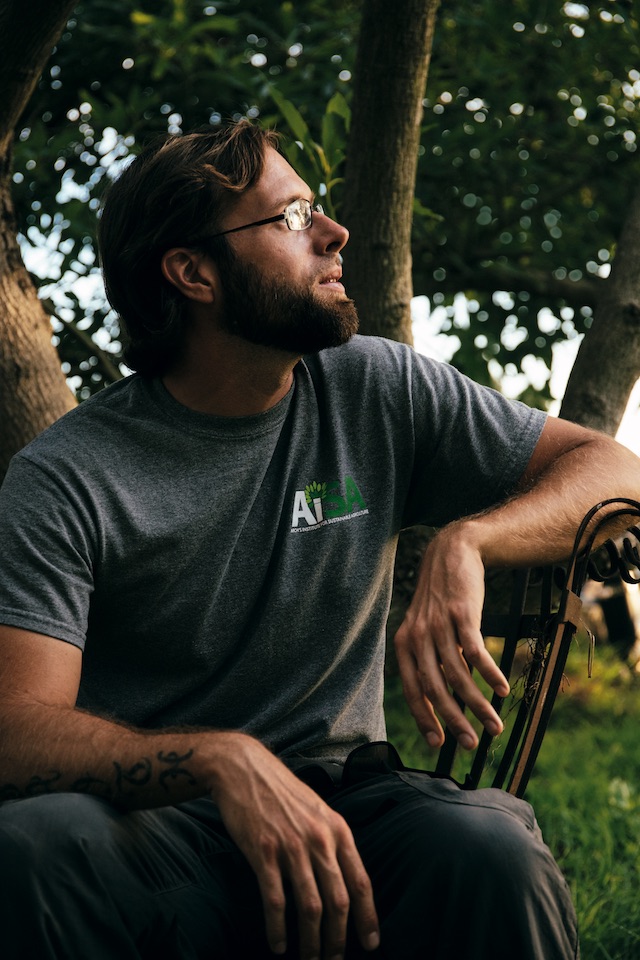
Paul Neely
“I’m helping the Earth stay alive,” says Neely, referencing the organic practices he learned at the veteran-focused Archi’s Institute for Sustainable Agriculture near San Diego. The former paratrooper still struggles with PTSD, resulting from 15 months in Iraq.
“Keeping life going is harder than people think,” says the 31-year-old, and it’s momentarily unclear whether he’s talking about himself or his crops or both. “It’s more than adding water to the ground. The plant itself changes so much. Not long ago, I didn’t know that the blossom is what turns into an apple.”
Neely, originally from Detroit, reflects on his pre-farming mindset with disdain. “I see in my own family how what they eat really is who they are. Half their meals are McDonald’s drive-through. They’re alive, but they’re not living.” Though the former paratrooper says he’ll always teach at Archi’s Institute, he recently moved onto 20 acres in nearby Warner Springs, California, with his dog, Odin, and plans to grow fruit trees, sweet potatoes, and watermelons.
These amazing people did something overseas and are well-qualified, some of the smartest and best. We’re tapping into that talent as opposed to trying to fix something. Everything’s got risk, but we’re focused on the upside.
The Archipleys consider Neely among their greatest successes. To be crude, one could compare it to investing in an undervalued asset class. “These amazing people did something overseas and are well-qualified, some of the smartest and best,” Colin explains. “We’re tapping into that talent as opposed to trying to fix something. Everything’s got risk, but we’re focused on the upside.” That upside, he believes, is tremendous: “The demand for organic and locally grown food far exceeds the supply.”
The couple have secured financing to increase their greenhouse space from 6,000 to 30,000 square feet and aim to turn Archi’s Acres into a national brand, comprising a network of greenhouses that employ – and are, in due course, owned by – alumni of Archi’s Institute. “It’s very much like a military structure,” Karen explains. “That greenhouse would remain part of the network, but the platoon commander could tailor the products to his or her market’s specific needs.”
Not all veteran-farmers are associated with a larger training program. Some, like Davon Goodwin, beat their own path. Goodwin, a former Army reservist, volunteered to go to Kuwait in 2009. “Kuwait turns into Iraq, Iraq turns into Afghanistan,” he says. “In Afghanistan, about nine months into my deployment, my convoy hit an IED. I suffered a traumatic brain injury.”
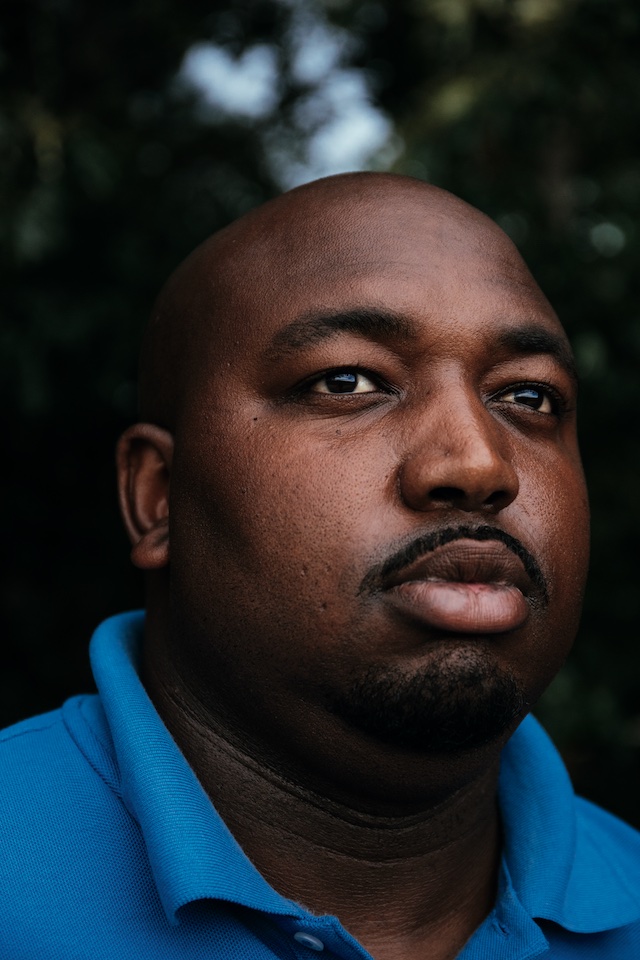
Davon Goodwin
A former Army reservist, Goodwin served in Kuwait, Iraq, and Afghanistan, where he suffered a traumatic brain injury that made finding a job almost impossible. Today, he runs his own 120-acre North Carolina farm, selling produce at prices his community can afford.
As a result, he developed narcolepsy. “College is obviously hard when you can’t stay awake. I made it,” Goodwin says of the botany degree he earned from the University of North Carolina at Pembroke. “But once I went looking for a job and told employers I had narcolepsy, they didn’t want to hire me. You can’t drive a state vehicle. You can’t drive any vehicle.” So he started to volunteer on farms, which is how the 28-year-old heard that Neil and Soledad Griffin, both doctors, needed help with their “little farm” near Raeford, North Carolina. “Turned out to be 500 acres,” recalls Goodwin, chortling.
Could I be making more money? Probably. I go back to my ethics. I got into this to feed my neighbors and increase access in minority and low-income communities.
For almost four years, he managed the couple’s produce and livestock operation. Then, in 2016, the Griffins told him to use 120 acres to “do your own thing.” Goodwin pays rent in labor, by continuing to manage part of their farm, and raises Dorper and Katahdin sheep, as well as table grapes. He prices those grapes significantly lower than nearby grocery stores do – less than $2 per you-pick pound – and if that’s still too dear for some families, he’ll tell folks to pay what they can.
“Could I be making more money? Probably. I go back to my ethics. I got into this to feed my neighbors and increase access in minority and low-income communities,” says Goodwin, awarded the Purple Heart for his heroics in Afghanistan. “When I was at war, in convoys, I didn’t want to do that half the time, but it was my duty. This is, too. I love serving my country.”
I have a 100% disabled Vet who needs help building a road, digging a pond and help resorting an old deserted farm in Central Maine. He does not want to be pressed into being a commercial farmer but needs help. His tractor engine blew and needs to be rebuilt. Is there any help you can offer him. He is a proud Vet, but agrees to needing some help. Please contact me ASAP to confirm or deny assistance.